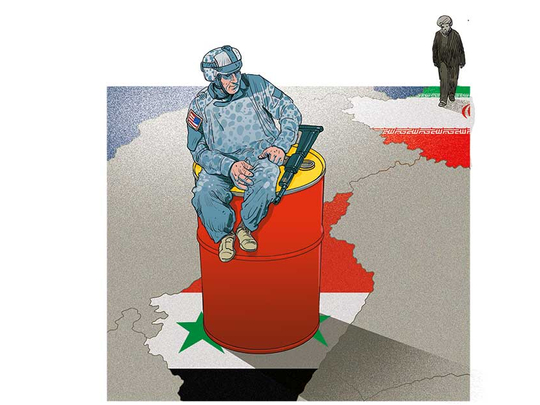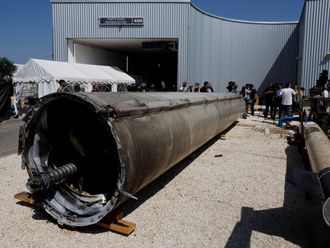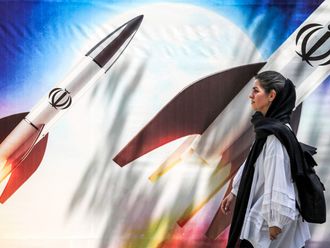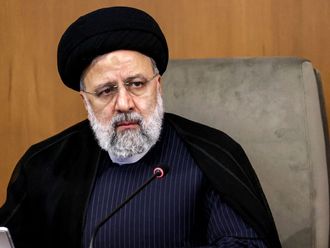
There are a lot of good arguments for maintaining an American presence in Syria after the fall of Daesh (the self-proclaimed Islamic State of Iraq and the Levant), but US President Donald Trump doesn’t seem persuaded by any of them. Perhaps he would back off his urge to cut and run if he knew that the United States and its partners control almost all of the oil. And if the US leaves, that oil will likely fall into the hands of Iran.
It’s one feature of a larger US mission in Syria that is really about containing Iranian expansionism, preventing a new refugee crisis, fighting extremism and stopping Russia from exerting influence over the region. The United States has serious national security interests in making sure that Syrian President Bashar Al Assad, Russian President Vladimir Putin and Iran don’t push America out of Syria and declare total victory.
But Trump has repeatedly said those tasks are not the United States’ responsibility. He promised to pull the approximately 2,000 US troops out of Syria at a campaign rally on Thursday in Ohio, Cleveland.
“We’re knocking the hell out of Daesh. We’ll be coming out of Syria, like, very soon,” he said. “Let the other people take care of it now.”
It’s not an offhand remark. Last month, Trump said that although he thinks the slaughter in eastern Ghouta by Russia, Iran and the Al Assad regime is “a humanitarian disgrace,” he has no intention of doing anything about it, because our mission is to “get rid of Daesh and go home.”
Of course, that contradicts his top national security officials. Defence Secretary Jim Mattis said late last year that the troops would stay to prevent “Daesh 2.0” and stabilise the situation. In January, Secretary of State Rex Tillerson laid out in a carefully workshopped policy speech five long-term goals for US policy in Syria, including ridding the regime of weapons of mass destruction and solving the political conflict. He promised that the United States “will maintain a military presence in Syria focused on ensuring Daesh cannot re-emerge.”
But if Trump disagrees and is looking for a Syria policy that fits his campaign, he might remember that he has constantly complained that in Iraq, “we should have kept the oil.” Of course, we can’t and shouldn’t take or keep Syria’s oil. But there’s a grain of truth in Trump’s idea. Control over oil is the only influence we have in Syria today.
Tehran’s strategy
“We have this 30 per cent slice of Syria, which is probably where 90 per cent of the pre-war oil production took place,” said David Adesnik, director of research at the Foundation for Defence of Democracies. “This is leverage.”
The actual people holding the land with the oil are not US troops, but the mostly Kurdish Syrian Democratic Forces that were trained and armed by Washington, along with local Arab leaders who are resisting the ongoing onslaught by government- and Iranian-backed forces.
The Al Assad regime and Iran have a stated and ongoing strategy to take back all the land that Al Assad once controlled, including the land containing Syria’s most valuable energy resources. What’s more, in May, Trump is expected to pull the United States out of the Iran deal, meaning that he will reimpose US sanctions on Iranian oil. It would be profoundly counterproductive to hand Iran control over a swathe of Syria that contains huge amounts of oil at the exact same time.
If the US troops leave, the Kurds are likely to cut a deal with the regime and leave the Sunnis to Al Assad’s cruelty. Then, the Iranians will move into the area, completing their land bridge of control from Tehran to Beirut. If Trump doesn’t have a real Syria strategy, he doesn’t have a real Iran strategy.
“Iran is turning its proxy network, its axis of resistance, into a region-wide resistance army,” said Melissa Dalton, senior fellow at the Centre for Strategic and International Studies. She said Iran now has more than 250,000 proxy forces directly or indirectly under its influence around the region.
Syrian opposition leaders are asking for the United States to work with both the Kurds and the Sunni Arab local leaders to consolidate control in liberated areas and help organise local governance. Those who have fought Daesh don’t want to live under the rule of Al Assad and Iran, said Mouaz Mustafa, executive director of the Syrian Emergency Task Force, a non-governmental organisation that works with the Syrian opposition.
“It’s incredibly important that with all these oil-rich areas ... we don’t end up in a situation where we do have to pull out and there is some sort of deal that allows Iran to essentially take the land, the oil, and these areas, and empower their land bridge that they’ve been building inside the country,” he said. “We took the oil. We’ve got to keep the oil.”
— Washington Post
Josh Rogin is a columnist for the Global Opinions section of the Washington Post. He writes about foreign policy and national security.











